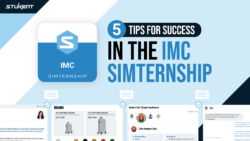Do you remember when you were first learning how to drive? You might have started learning about laws and traffic signs in Driver’s Ed, then went on to practice in a vehicle with a teacher or parent. Once you got behind the wheel, you could finally apply the concepts you had learned and put your knowledge to the test.
Just as you must get behind the wheel to become a proficient driver, you must engage in real practice to become effective in most roles. April Schofield, a lecturer and director at Metropolitan State University of Denver, believes this is true with sales education.
In April’s Stukent® Digital Summit: Professional Selling session, she highlighted the skills that professional selling employers want and describes how to get students “behind the wheel” to become successful selling professionals. Read on for a recap of her insights!
What skills do employers want?
During her session, April explained that many students enter a sales role, even if they originally planned otherwise. In fact, according to a report from the Sales Education Foundation, more than 50% of U.S. college graduates, regardless of their major, accept their first job in a sales role.
The same report also showed that over 60% of all new salespeople will fail within their first year of employment.
When developing a curriculum for sales students, it is vital to think about what hard and soft skills students need to succeed, regardless of whether they decide to enter an actual sales position or not, right out of school. In her presentation, April explains what hard skills and soft skills are essential for students. Watch here:
“Every advisory board meeting I have had with employers, the message is very consistent: Help students develop soft skills,” April says. “They are not saying neglect the hard skills, but this is an area they ask us to focus on.”
According to a poll conducted by Morning Consult for the U.S.-based education and technology firm Cengage, 65% of employers chose soft skills as their most demanded skills. These skills include listening, communication, critical thinking, active learning, and more.
Yet, according to that same report, 34% said schools do not adequately prepare students with these skills. How do we improve this? April likes to think about teaching these skills as one would drive a car.
“Just like driving, we’re going to start by teaching the rules, the process, and the science, but then we want you behind the wheel,” April says. “We want you to be in a sales role with somebody alongside you to guide you. And we want you to be in that role before you walk along the graduation stage.”
How can you structure courses and assignments to build these skills?
During the session, April shared three assignment ideas you can use to get students “behind the wheel” to practice both their hard and soft skills.
Idea 1: Etiquette Dinner
April’s program hosts an “Etiquette Dinner” as an assignment for multiple classes. They host the event to teach students about dining etiquette, social expectations, and introductions, allowing them to practice in a low-risk environment.
“We know that when our students enter a sales role, they are likely going to attend a business event that includes a meal,” April says. “So we want to equip them with the confidence to navigate those formal dining situations gracefully.”
During dinner, they had an etiquette presentation that showed students which utensils to use, where to rest their arms, and more. They also had a presentation on how to dress professionally.
Idea 2: Ride-Alongs
A ride-along is a practice in the sales industry where a less-experienced salesperson accompanies a more experienced salesperson on calls or visits to clients or prospects. This experience allows students to observe and learn. They also can ask questions, get mentoring, and build confidence in what they know works.
“We thought, we have experienced salespeople who are involved in our program,” April says. “Let’s give our students that ride-along experience with them now.”
Idea 3: Competitions
April encourages educators to use role-playing to bring real-world training into the classroom. Students can role-play and practice their selling and pitching skills through simulations, competitions, and mock interviews. For example, April’s program hosts the Rocky Mountain Madness 5, which is a role-play competition where they use brackets.
April’s insights remind us that practical experience, like getting behind the wheel when learning to drive, is essential for success. Employers crave soft skills, and just as we learned the rules of the road before taking control of the car, students should be equipped with the knowledge and then placed in real-world scenarios to develop the skills they need.
Stukent Student Sales Competition
Stukent is hosting its first-ever Student Sales Competition from Sept. 29 to Oct. 6. There are only 125 spots available for registration. The top three winners will receive a monetary prize and certificates of placement. The top twenty participants will receive Certificates of Excellence. You can learn more about the competition and registration here.
Stukent is here to help educators help students help the world. To learn more about our first-in-the-world Simternships™ and courseware, or to get FREE instructor access to our products, visit us online.






